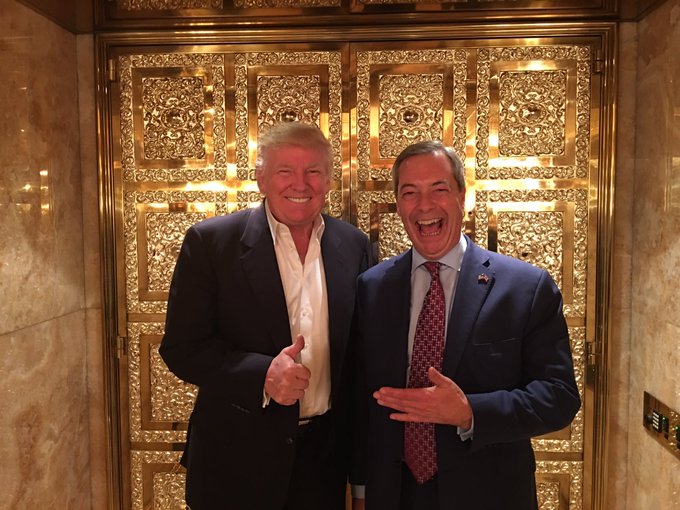The kinetic presidency of Donald Trump continues to stir up an abundance of news. But I wanted to draw your attention to some critical developments out of the UK over the weekend, ones that bear directly on Russian support for Donald Trump during the 2016 election and after. Indeed, they show up-close a Russian model of infiltrating and supporting campaigns to secure Russian strategic interests in Europe and the United States.
The story centers on a man named Arron Banks, financial supporter for the pro-Brexit “Leave” campaign in 2016 and what now appears to have been his deep financial ties to Russian businessmen and diplomats in London.
There was a more mainstream “Vote Leave” campaign as well as a smaller and more aggressive campaign called “Leave.EU”, which was bankrolled by Banks and associated with Nigel Farage, the UK Independence Party leader who was widely identified with the Leave campaign and campaigned for President Trump in 2016. The Leave.EU campaign also had a close relationship with the now-defunct Cambridge Analytica.
Banks is a wealthy one-time Conservative party donor who switched his allegiance in 2014 to the populist/nationalist UK Independence Party, a staunchly anti-EU party which managed to surge to substantial support in the 2015 election (12.6% of the popular vote) while getting virtually shut out of parliamentary seats (only 1). Banks then turned his attention to the Leave campaign. He only became a visible figure in UK politics when he made the switch to the UKIP. He had vast sums to spend.
What has emerged over the weekend, contrary to his earlier emphatic denials, is that during this time Banks was holding a series of meetings with high-ranking Russian officials including Russian Ambassador to the UK, Alexander Yakovenko – meetings which continued from 2015 to 2017, according to emails obtained by The Guardian.
Yakovenko was also named in the Papadopoulos court documents.
Just after the Brexit campaign began Yakovenko introduced Banks to a Russian businessman who offered Banks a business deal in the Russian gold sector which would likely have netted Banks billions of dollars. (The plan was to invest in a series of Russian gold firms which would then be merged into a single entity, netting billions in profits. It’s still unclear whether this happened and whether Banks got the money.)
The basic outlines are worth noting.
Turbulence in or breakdown of the EU is a key Russian strategic goal. Russian diplomats courted key Brexit leaders (Banks, Farage, et al.) and apparently offered opportunities to get huge sums of money. (These players each also have relationships with Julian Assange.) Banks and his business partner Andy Wigmore, who was Communications Director for Leave.EU, appear to have been in regular contact with Russian officials throughout the campaign. In other words, the relationship between Russia and the Brexit campaign now looks very much like what President Trump’s accusers believe happened simultaneously in the United States. Indeed, the Farage/Brexit campaign was tightly intertwined with the Trump campaign.
Once the Leave forces won the referendum, Banks, Wigmore and Farage turned attention to campaigning for Trump. They traveled as a group to Mississippi in August 2016 where Farage, fresh off his Brexit triumph, campaigned with Trump in Jackson, Mississippi on August 24th. This was just six days after one of Banks’ meetings with Yakovenko.
The trio was also at the GOP convention a month earlier. They also shared digital media firm Cambridge Analytica. Later it emerged that Farage had an on-going back-channel to Julian Assange.

The relationship continued after Trump’s win, with Farage a regular in meetings surrounding the transition. Trump even made noises at one point about demanding that Farage be made Ambassador to the US – a crazy idea given the UK’s professionalized diplomatic corps and Farage’s lack of any connection to the mainstream political parties.
Most of the things we’d like to know about the connection between Banks/Farage/Brexit and the 2016 campaign Trump we don’t know yet. But what many have long suspected now seem clear – Russia put its support and money behind the Brexit campaign and quite likely gave it the critical assist that made a close win possible. Both in the UK and the US we still need to know more about how the Russian intelligence information campaigns interacted with the work of firms like Cambridge Analytica and others who were working for campaigns the Russians were actively supporting. In other words, were Russian operatives working on the ground, in digital campaigns, as an adjunct to courting the leadership?
There’s a lot here and a lot more we need to know. It lends a lot of weight to the maximalist understanding of what was happening between Trump and Russia in 2016 and since.

No comments:
Post a Comment
Note: Only a member of this blog may post a comment.